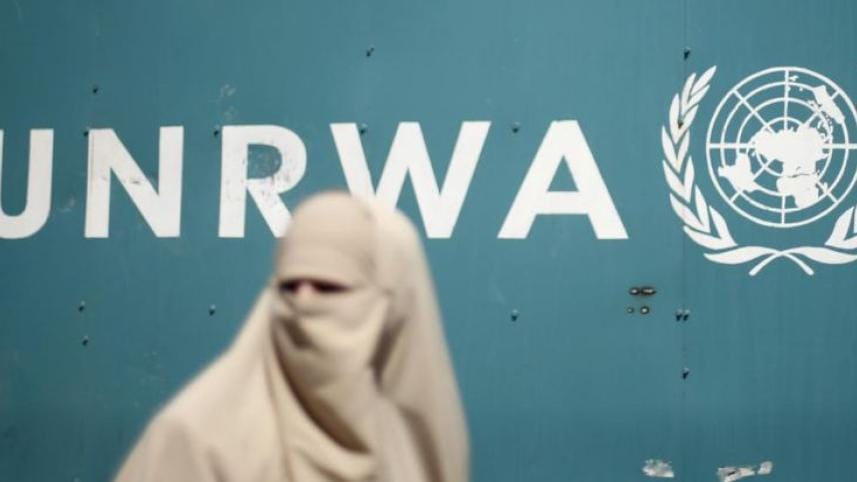US ends funding for Palestinians

Palestinians reacted angrily yesterday to a US decision to end all funding for the UN agency that assists three million needy refugees, seeing it as a new policy shift aimed at undermining their cause.
Washington, which until last year was by far the biggest contributor to the UN Relief and Works Agency for Palestine refugees, announced on Friday that it would no longer make any contributions to the "irredeemably flawed operation."
President Donald Trump's administration has backed Israel in accusing the nearly 70-year-old agency of perpetuating the Middle East conflict by maintaining the idea that many Palestinians are refugees with a right to return to homes in what is now Israel, something they both oppose.
But to Palestinians, the right of return for the hundreds of thousands who fled or were expelled during the 1948 war that accompanied Israel's creation is a central plank of their cause.
Its calling into question by Trump follows his December recognition of the disputed city of Jerusalem as Israel's capital and axing of more than $200 million in bilateral aid for Gaza and the West Bank.
The new policy on Jerusalem overturned decades of precedent and prompted the Palestinian leadership to break off relations with the White House.
'CRUEL AND IRRESPONSIBLE'
Senior Palestinian official Hanan Ashwrawi described the latest US move as "cruel and irresponsible".
"The Palestinian refugees are already the victims who have lost their homes, livelihoods and security as a result of the creation of the state of Israel," she said.
"Once again, they are being victimised by the US administration in support of Israel's decades-long military occupation and impunity."
UNRWA was already facing a financial crisis after Trump announced a $300 million funding freeze in January but now faces the threat of major closures to its network of schools and health centres.
In the impoverished Gaza Strip, where most children learn in UNRWA schools, the US decision has raised fears for their future education.
"If they stop the aid completely it would have a major effect on our children," said Abu Mohammed Huweila, 40, from the Jabalia camp in northern Gaza.
Huweila, whose nine children have all attended UNRWA, called the move "an unjust decision" that went against their right to education.
"POLITICAL BLACKMAIL"
Another Gaza resident, Hisham Saqallah, 55, said the US move was "political blackmail" that would merely increase unrest.
"If they stop aid to schools, this means destroying the futures of a large number of students and throwing them into the street," he said.
"I do not think that it can eliminate our Palestinian cause. It is a just cause. If the aid is stopped, the Palestinian struggle will continue."
UNRWA spokesman Chris Gunness called the US decision "highly regrettable," saying the organisation would "try to make up the $217 million shortfall".
"If not some of the most marginalised and vulnerable people on the planet may well suffer," he told AFP.
"People are going to become more desperate and marginalised," he said, warning of "dramatic, widespread, profound and unpredictable" consequences.
Jordan, which is one of just two Arab countries to have signed a peace treaty with Israel, already announced plans to organise an emergency fund-raising conference on the sidelines of the UN General Assembly in New York next month.
Foreign Minister Ayman Safadi said the September 27 event aimed to secure alternative funding and "reaffirm that UNRWA is an organisation created by the UN General Assembly, with a clear and particular role, and this role must continue".
State Department spokeswoman Heather Nauert said the US would "intensify dialogue with the United Nations, host governments and international stakeholders about new models and new approaches" for assisting needy Palestinians.
But Hugh Lovatt, Israel Palestine analyst at the European Council for Foreign Relations, said Washington would find scant support for its push for an alternative aid conduit.
He said it was an attempt to "unilaterally take the Palestinian right of return off the table".
"But US actions are misguided, dangerous, and won't work," he said, since "neither Lebanon or Jordan can be expected to play along."
And even if the US succeeds in eliminating UNRWA and changing the definition of the world's 5.3 million registered Palestinian refugees, "Palestinian refugees will remain, and will keep demanding their right of return."



 For all latest news, follow The Daily Star's Google News channel.
For all latest news, follow The Daily Star's Google News channel.
Comments